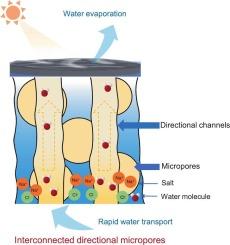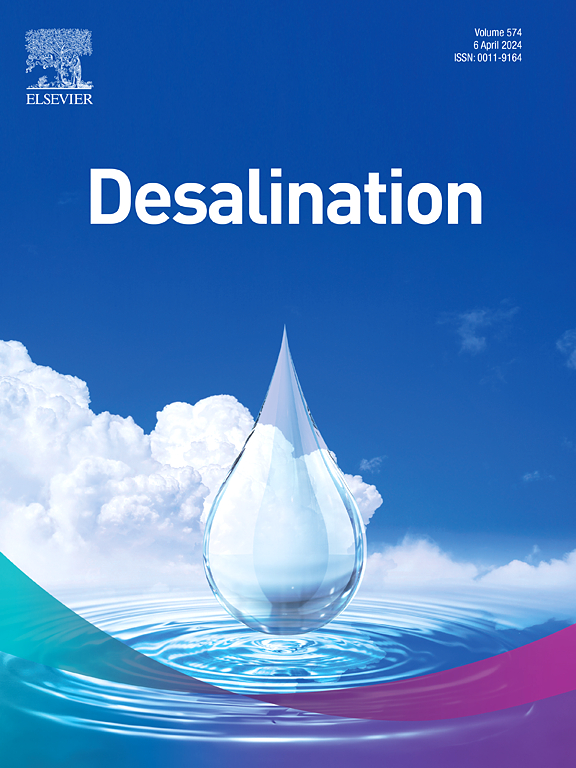Robust and salt-resistant zwitterionic hydrogel evaporator with interconnected directional micropores for efficient solar water desalination
IF 9.8
1区 工程技术
Q1 ENGINEERING, CHEMICAL
引用次数: 0
Abstract
Hydrogel-based interfacial evaporators have demonstrated effective solar evaporation performance for supplying clean water. However, balancing a high evaporation rate, salt-resistant performance, and enhanced mechanical properties remains challenging. Herein, through structural design and chemical modification, a robust and salt-resistant hydrogel evaporator comprising interconnected directional micropores with excellent desalination performance is fabricated by the strategy of sacrificial template-assisted solvent exchange and directional vertical freezing. The hydrogels can withstand cyclic compression and stabilize shape in 3.5–20 % salt solutions. Due to the pores' high porosity and low tortuosity, the evaporator possesses an evaporation rate of 3.12 kg m−2 h−1 under one sun illumination. In addition, since a zwitterionic polymer is used to improve the salt-resistant performance, no salt deposition was observed on the surface of hydrogel evaporators after 8 h irradiation in a 20 wt% salt solution. The durability and practicability of the evaporators are also evaluated through purification experiments among various contaminants and outdoor evaluations. It is anticipated that the zwitterionic polymer-modified directional porous hydrogel evaporators will provide a viable solution to the shortage of freshwater resources and play a significant role in promoting the development of seawater desalination.

坚固的耐盐两性离子水凝胶蒸发器,具有相互连接的定向微孔,用于高效的太阳能海水淡化
基于水凝胶的界面蒸发器在提供清洁水方面表现出了有效的太阳能蒸发性能。然而,平衡高蒸发速率、耐盐性能和增强的机械性能仍然是一个挑战。本文通过结构设计和化学修饰,采用牺牲模板辅助溶剂交换和定向垂直冷冻的策略,制备了具有优异脱盐性能的由相互连接的定向微孔组成的坚固耐盐水凝胶蒸发器。在3.5 - 20%的盐溶液中,水凝胶可以承受循环压缩并保持形状稳定。由于孔隙率高、扭曲度低,在一次光照下蒸发器的蒸发速率为3.12 kg m−2 h−1。此外,由于使用了两性离子聚合物来提高耐盐性能,因此在20%的盐溶液中照射8小时后,水凝胶蒸发器表面未观察到盐沉积。通过各种污染物净化实验和室外评价,评价了蒸发器的耐用性和实用性。预计两性离子聚合物改性定向多孔水凝胶蒸发器将为解决淡水资源短缺问题提供可行的解决方案,并对海水淡化的发展起到重要的推动作用。
本文章由计算机程序翻译,如有差异,请以英文原文为准。
求助全文
约1分钟内获得全文
求助全文
来源期刊

Desalination
工程技术-工程:化工
CiteScore
14.60
自引率
20.20%
发文量
619
审稿时长
41 days
期刊介绍:
Desalination is a scholarly journal that focuses on the field of desalination materials, processes, and associated technologies. It encompasses a wide range of disciplines and aims to publish exceptional papers in this area.
The journal invites submissions that explicitly revolve around water desalting and its applications to various sources such as seawater, groundwater, and wastewater. It particularly encourages research on diverse desalination methods including thermal, membrane, sorption, and hybrid processes.
By providing a platform for innovative studies, Desalination aims to advance the understanding and development of desalination technologies, promoting sustainable solutions for water scarcity challenges.
 求助内容:
求助内容: 应助结果提醒方式:
应助结果提醒方式:


